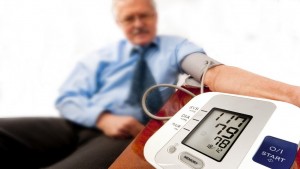In the UK, it is estimated that there are over 16 million people that have high blood pressure and as many as 5 million may not be aware they are affected.
As your heart pumps blood round your body, the blood pushes against the arteries walls, this is your blood pressure. Blood pressure is measured with two figures systolic and diastolic blood pressure, systolic pressure is the highest level the system reaches as your heart is beating. The diastolic pressure is the lowest pressure your system reaches as your heart relaxes between beats. These number are written on top of each other i.e. 120/80 and are measured in millimetres of mercury (mmHg).
Blood pressure is a really important factor in an individual’s health as elevated levels put strain on blood vessels and the heart, this extra strain can increase the risk of Heart attack, Heart Failure, Kidney disease, Stroke and Dementia. Elevated levels are known as ‘High blood pressure’ or ‘Hypertension’ and are figures measured above 140/90 mmHg.
High blood pressure does not usually present any symptoms and can go unnoticed if not checked.
High blood pressure can result from a lifestyle with low exercise levels, being a smoker, being overweight, drinking alcohol and not eating enough fruit and vegetables but are also related to a family history of high blood pressure and being of African or Caribbean decent.
The only way of knowing if you have hypertension is to have your blood pressure checked. The National Health Service (NHS) recommends having a blood pressure check at least every 5 years.
During a recent screening program of over 2,300 employees, Healthy Performance identified 185 people that had high blood pressure and needed to be referred to their GP for further investigation. We also advised another 470 people of how they can make lifestyle changes to improve their blood pressure without medical intervention.
How many people could we help in your workforce?
Although the diseases associated with hypertension are potentially serious there are some very easy ways to lower and maintain healthy blood pressure including,
- Reduce the amount of salt consumed
- Reduce caffeine consumption
- Increase aerobic exercise
- Reduce and stop smoking
- Reducing weight to healthy levels












